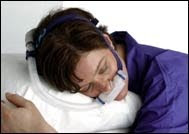 Parenting seems a lot less rewarded when you’re waking constantly to tend to a crying child. Consistent fatigue can suck the joy out of one of life’s most gratifying milestones. The good news is the end is in sight, and it’s a lot closer than you might think.
Parenting seems a lot less rewarded when you’re waking constantly to tend to a crying child. Consistent fatigue can suck the joy out of one of life’s most gratifying milestones. The good news is the end is in sight, and it’s a lot closer than you might think.More than half of babies sleep through the night after about two or three months, researchers have discovered. A much smaller number of parents won’t be so lucky. Less than 15 percent of babies won’t stop waking or crying until after their first birthday.
The study looked at the sleep patterns of 75 healthy newborns over 12 months. During that timeframe, parents kept sleep diaries for their child and installed a camera where the baby slept to make time-lapse recordings. Researchers used the video to check the accuracy of the sleep logs.
The study reports the largest change in uninterrupted sleep came after the first month. The average child sleeps an extra three hours without waking. At three months, half of babies began sleeping from midnight to 5 a.m. One month later the same group slept from eight hours.
Parents also reported better rest after five months. Half of the new parents reported sleeping six hours or more.
A small number of the babies still regularly woke after their first birthday.
Parents may be able to help children who frequently wake late in their infancy. Make sure the baby’s sleep environment is comfortable, quiet and dark. Babies should be on a consistent sleep and feeding schedule.
Other factors, such as health problems can keep children awake. Consult a doctor if your child’s sleep doesn’t significantly increase after a year.


 Some people are naturally wired to be tired. About 25 percent of people carry a gene variant that makes them sleepier than their peers, researchers have discovered.
Some people are naturally wired to be tired. About 25 percent of people carry a gene variant that makes them sleepier than their peers, researchers have discovered.











